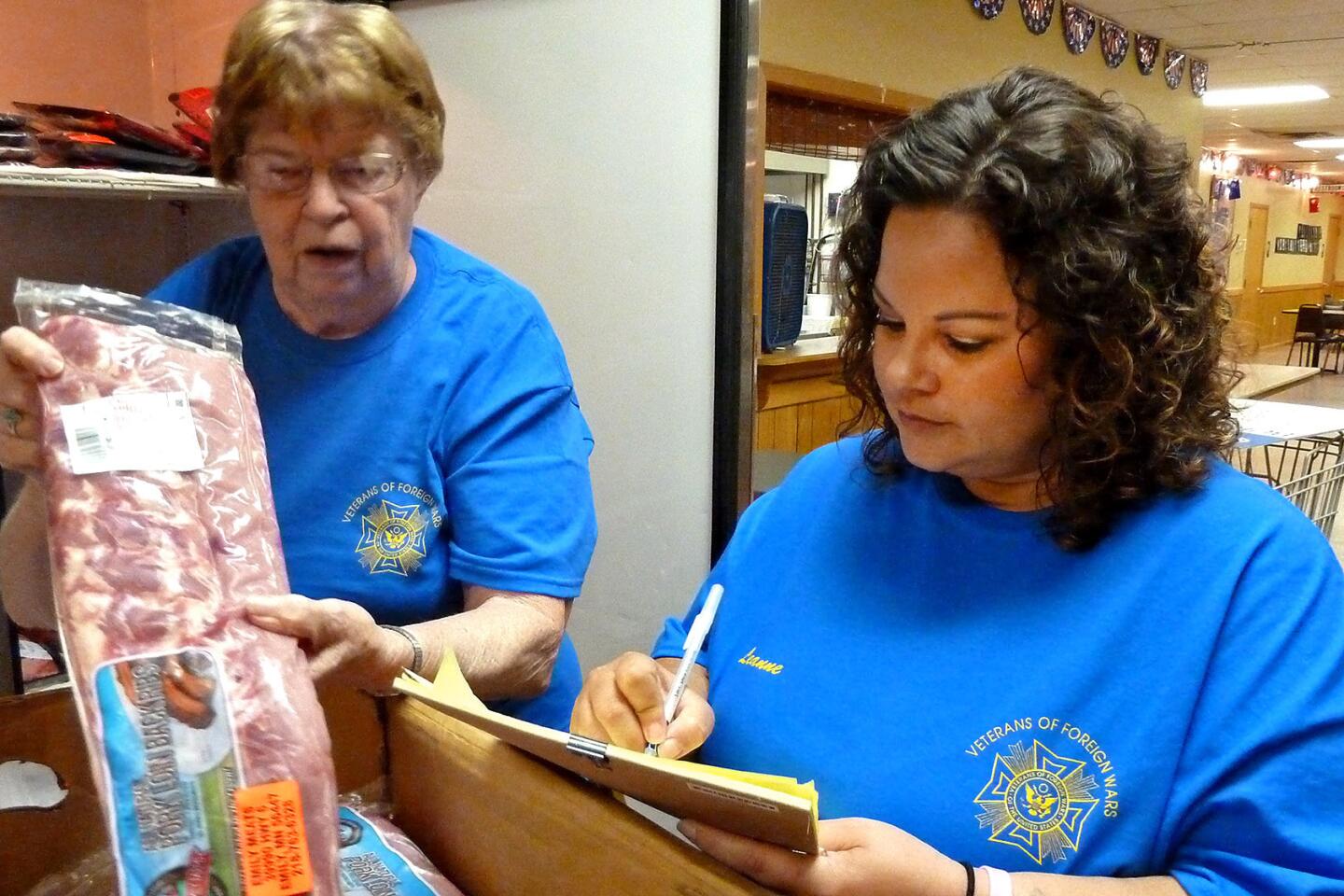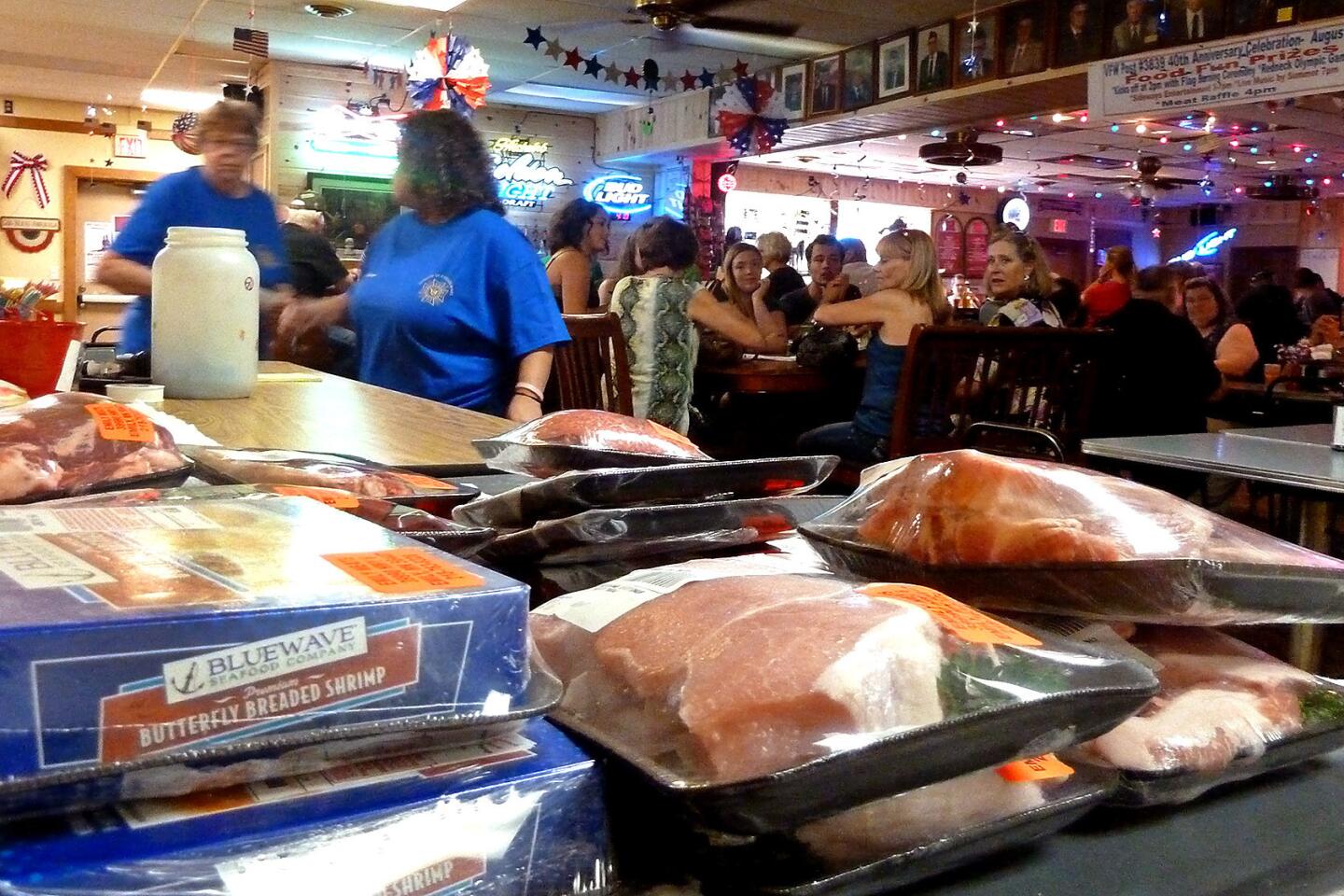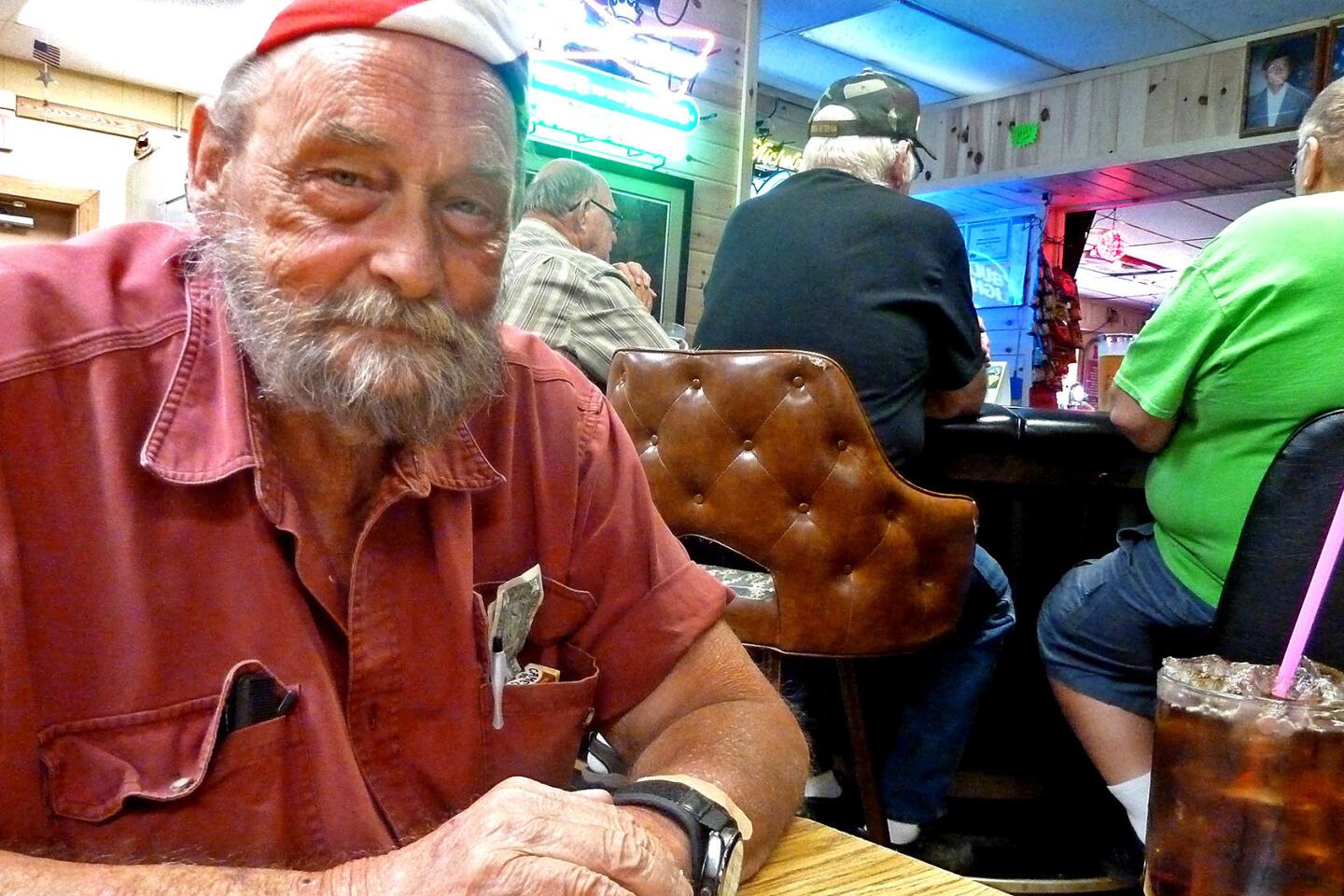Great Read: On a night out, Minnesotans hope to get lucky at meat raffle
- Share via
They sit at a table near the bar, the three farmer’s daughters and their boisterous friend, all of them single, in their 40s and 50s. With Johnny Cash on the jukebox, their cocktails before them, they’re ready for an action-packed Saturday night.
Sure, there are plenty of eligible men on hand up here in the Minnesota north woods — good-looking ones too, with summer tans, fishing caps and ready smiles — but these women are eyeing another quarry entirely.
Like a package of raw T-bone steaks, beef tips, thick bottom rounds, butterfly pork chops or a nice roast. In a pinch, they’ll take chicken breasts, ribs, sausage, bratwurst or, heck, even hamburger.
The women are among the crowd at Veterans of Foreign Wars Post 3839, home to a long-standing cultural practice that’s as much a part of this state’s identity as hockey, brutal winters and Lake Wobegon: the meat raffle.
At hundreds of bars, pubs and American Legion halls — in big cities and in small towns like Moose Lake, Long Prairie and Fergus Falls — the faithful gather for a few drinks and a chance at taking home that night’s dinner without having to shoot it themselves.
Mary Wiener (her real name, honest), a lab technician from St. Cloud, starts a cheerleader’s chant, and the farmer’s daughters — out for a women-only camping weekend — join in, raising their glasses as though engaging in some holiday toast.
“Do we want grilled steak?”
“Yeah!”
“Do we want bottom round?”
“Yeah!”
Wiener, a true meat-and-potatoes woman, sips her first Miller Genuine Draft of the evening. “I’m going for the bacon,” she says.
At a dollar a chance, patrons bet on meat raffle and meat bingo, spinning the big wheel or drawing numbers from a jar. They eye their tickets until the winners are called, the losers ripping up their stubs like gamblers at the track.
Meat raffles enable bars in small towns like Jenkins, where work is seasonal and unemployment high, to pack in customers and support local causes. Even the gambling control board rakes in revenue: Meat raffles contribute to the $40 million in taxes collected each year from such charity-driven games of chance.
Things can get crazy. One Minneapolis bar sponsored the show “Risk Your Meat,” a sort of “Let’s Make a Deal” version of the raffles to increase your meat stockpile.
But nobody throws a meat raffle like VFW Post 3839. A Minnesota TV station recently ranked the Jenkins raffle as the most popular in the state because of its friendly staff and antics such as calling big winners “meat hogs.” The club has an eclectic air of the veterans and outdoorsmen who hang out there: In the parking lot sits a Korean War-era tank, and inside is a painting of a jumping northern pike snatching a lure.
On summer weekends, this town of 430 residents can draw hundreds who line the VFW bar three-deep and fill a scramble of tables in adjoining rooms. Everyone is clamoring for the attention of the women in blue shirts, known as the “meat girls,” hustling tickets between packed tables.
One Saturday in August, 100 patrons sit ready for the 4 p.m. start, the frenzy of the hunt in the air.
But there’s a problem: The meat deliveryman is nowhere to be found.
And none of the staff members want an insurrection on their hands.
::
Meat raffles came to Minnesota after the end of World War II when the trend took hold in the northern U.S. and Canada.
In 1992, the commander at VFW Post 3839 floated a plan to sell tickets at a dollar apiece. As the evening wears on, the value of the meat increases from $5 to $7.50, $10 and $15. That enticed gamblers to stick around and spend more money on drinks.
The VFW staff distributed posters along Highway 371 and throughout Crow Wing County. Raffles were on Friday, Saturday and Sunday evenings.
Business exploded. There are 30 similar meat raffles today at nearby bars, but VFW Post 3839’s raffle has got them all beat, even drawing people from neighboring states.
Since then, the raffles have become an economic necessity in this depressed town, which some call God’s country and others, godforsaken. After the last tourist weekend each year, the November start of hunting season, the VFW post relies on locals to carry the gambling freight.
But summertime is the high life. So far this year, the raffles have brought in $75,000. After paying for taxes and the cost of the meat, the post donated $25,000 to veterans, student scholarships, and police and fire departments for equipment.
So, what is it about Minnesota’s lust for meat? Gambling manager Dan Lohse stands at the bar, bearing his sizable stomach. “We just like to eat, can’t you tell?”
Manager Deb Tulenchik has another theory: that the region’s hunting cultures believe a thick steak is a requisite for the good life. “We’re rednecks,” she said. “For us, meat makes the world go round.”
::
The butcher arrives just in time, delivering half a dozen large boxes of meat wrapped in clear plastic, which are quickly stored in a kitchen cooler.
One of the meat girls takes the microphone, announcing that the $5-value round is on. Audience members hoot.
The farmer’s daughters are from a family of eight girls and four boys: Nurse Mary Sanders, 49, who is divorced, is the youngest present. She sits near Danya Rice, who is retired at 56 and widowed. The eldest is Karen Ranta, 59, a nurse who also lost her husband.
They know they can’t flaunt their winnings. One night, all eight sisters showed up and won a mountain of meat, drawing jealous stares.
“It’s like the little old ladies at the bingo hall,” Ranta says, nursing her Jack Daniels and Coke. “They don’t want you to win. People got crabby.”
The meat girls have a non-gambler pick the winning numbers, which are read over the loudspeaker. Wiener’s number is called. She leaps into the air, rushing to a table beneath a mammoth papier-mache pig with black booties known as Sgt. Grunt.
She takes her time, examining the packages like a savvy grocery store shopper. She chooses a boneless pork roast, which a worker tosses into a plastic bag.
Several winners later, with her next called number, Wiener picks a package of hamburger. A few drawn numbers later, she wins yet again and selects bottom round steak.
In 15 minutes Wiener has collected an armful of meat, so it’s time for the meat girls to acknowledge her luck — or, as some losers complain, greed. She’s given a “meat hog” sticker, which she immediately places on her chest to hoots from the table, and later is handed a porcine plastic nose to wear. Often, the evening’s victors are pushed to their car in a shopping cart along with their larder.
White-bearded Gene Bienusa sits glumly with his pile of losing tickets. “Just my luck, one number off,” says the 69-year-old long-distance trucker. He’s wearing a bandanna the colors of the American flag, and the name of his ex-wife, Loyce, is tattooed on his right forearm. “This game must be fixed.”
Nearby, the farmer’s daughters are getting distracted. Sanders orders another Captain Morgan and Coke, and checks out a man with blond hair and yellow muscle shirt.
“When did he come in?”
Someone else says, “That guy over there? He’s married to the bartender.”
“Dammit.”
Rice looks up from her tequila shot and notices Bienusa sitting alone. She’s got a sense of humor about her single status, advertising on a dating website for farmers: “Must have teeth.”
“I want to win for him,” she says of Bienusa. “He has a sadness in his eyes.”
“He’s probably got more money than I do toilet paper,” Sanders says. Somebody invites him over to the table.
Wiener wins again, doing a dance on the way to choose her prize. “I don’t share my meat well,” she admits. “If it’s good meat, I keep it all to myself.”
Then the meat jokes start and Rice blesses herself.
The sisters talk about how their father, Elwood Hurrle, has been depressed since their mother, Mary Ellen, died. Rice wants to win him something to make him feel better.
Moments later, her number is called. “I won! I won! What did I win?”
“Sausage,” someone whispers, as if it’s a booby prize. She returns with a blueberry pie.
A round of drinks arrives. Four hours after she bought her first ticket, Rice is told by one of the meat girls that this is the last round.
“Thank God,” she says. “I don’t think I can take any more.”
Twitter: @jglionna
More to Read
Sign up for Essential California
The most important California stories and recommendations in your inbox every morning.
You may occasionally receive promotional content from the Los Angeles Times.
















